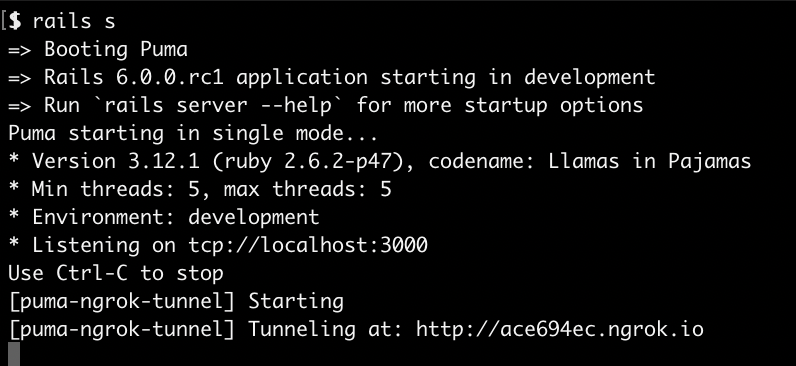https://github.com/mikerogers0/puma-ngrok-tunnel
Puma plugin for starting a Ngrok Tunnel
https://github.com/mikerogers0/puma-ngrok-tunnel
gem ngrok-tunnel puma ruby ruby-on-rails
Last synced: 4 months ago
JSON representation
Puma plugin for starting a Ngrok Tunnel
- Host: GitHub
- URL: https://github.com/mikerogers0/puma-ngrok-tunnel
- Owner: MikeRogers0
- License: mit
- Archived: true
- Created: 2019-05-04T20:58:55.000Z (about 6 years ago)
- Default Branch: master
- Last Pushed: 2021-03-28T19:02:28.000Z (about 4 years ago)
- Last Synced: 2025-01-20T23:31:13.437Z (5 months ago)
- Topics: gem, ngrok-tunnel, puma, ruby, ruby-on-rails
- Language: Ruby
- Homepage: https://github.com/MikeRogers0/puma-ngrok-tunnel
- Size: 82 KB
- Stars: 45
- Watchers: 2
- Forks: 5
- Open Issues: 0
-
Metadata Files:
- Readme: README.md
- Changelog: CHANGELOG.md
- License: LICENSE
- Code of conduct: CODE_OF_CONDUCT.md
Awesome Lists containing this project
README
puma-ngrok-tunnel
A plugin for puma that'll start a ngrok tunnel to your rails server when puma starts. Primary I built this to make the following a easier:
# Deprecation Notice
This gem is not longer actively maintained, I suggest using theses alternatives instead:
- [Overmind](https://github.com/DarthSim/overmind) or [Foreman](https://github.com/ddollar/foreman)
- [Docker ngrok](https://hub.docker.com/r/wernight/ngrok/)
# What it does

* Working with apps that require Webhooks to be received by the app to work correctly
* Demoing your local rails app to someone else
* Working with [Puma-dev](https://github.com/puma/puma-dev/) so your apps feels as production-like as possible
* Testing on mobile.
I've setup a [sample Rails 6 app](https://github.com/MikeRogers0-YouTube/puma-ngrok-tunnel-SampleRails6App) which demos an implementation of this gem.
## Installation
### Adding ngrok package to your machine
Make sure you have installed ngrok on your machine:
```bash
$ brew tap caskroom/cask
$ brew cask install ngrok
```
### Adding the gem
I've automated these steps into an `app:template` which can be found on [Rails Bytes](https://railsbytes.com/templates/xkjseg). However, if you'd like to install it manually follow these steps:
1. Add this line to your application's `Gemfile`:
```ruby
group :development do
gem 'puma-ngrok-tunnel'
end
```
2. And then execute:
```bash
$ bundle
```
3. Append this line to your `config/puma.rb` file:
```ruby
plugin :ngrok_tunnel if ENV.fetch('RAILS_ENV') { 'development' } == 'development'
```
4. Lastly, update your `config/environments/development.rb` to include the line:
```ruby
# puma-ngrok-tunnel: Allow connections from ngrok
config.hosts << /[a-z0-9.]+.ngrok.io/
```
## Usage
Read about how to configure puma to use this in [the Puma documentation](https://github.com/puma/puma#plugins).
There are a few variables this plugin reads from the environment which control its behavior. These are based on the arguments you'd pass to the [ngrok terminal command](https://ngrok.com/docs#http-subdomain).
* `PORT` - Optional, your rails port, defaults to `3000`. If `NGROK_ADDR` is set, this is ignored.
* `NGROK_ADDR` - Optional, if you're using Puma-dev set this to be your hostname & port, e.g. `my-app-name.test:443`.
* `NGROK_AUTHTOKEN` - Optional, your ngrok authtoken. If you have ngrok configured on your local machine you don't need this.
* `NGROK_HOST_HEADER` - Optional, if you're using Puma-dev you should set this to your virtual host e.g. `my-app-name.test`.
* `NGROK_CONFIG` - Optional, your ngrok configuration file location, defaults to `~/.ngrok2/ngrok.yml`.
* `NGROK_SUBDOMAIN` - Optional, ngrok will assign you a random subdomain unless this is set.
* `NGROK_REGION` - Optional, the region of your ngrok tunnel. The default is `us`.
* `NGROK_HOSTNAME` - Optional, full ngrok hostname, shouldn't be set if `NGROK_SUBDOMAIN` is set.
### Sample .env for use with `rails s`
```bash
# puma-ngrok-tunnel setup
# You need https://github.com/bkeepers/dotenv setup to make sure Puma can use these.
export NGROK_TUNNEL_ENABLED=true
export NGROK_SUBDOMAIN=my-app-name
export NGROK_REGION=eu
```
### Sample .env for use with Puma-dev
```bash
# Puma-dev: You need to define this otherwise it uses it's own puma.rb file.
CONFIG=config/puma.rb
# puma-ngrok-tunnel setup
# These should start with 'export' otherwise puma-dev won't use them.
export NGROK_SUBDOMAIN=my-app-name
export NGROK_REGION=eu
# The URL (and HTTPS Port) you might use to access this under Puma-dev
export NGROK_ADDR=my-app-name.test:443
export NGROK_HOST_HEADER=my-app-name.test
```
## Pitfalls & solutions
### The ngrok tunnel not always stopping when puma-dev stops
If you see an error saying `http: proxy error: dial unix`, it means ngrok was able to stop when puma was stopped. Right now the solution is to run:
```bash
pkill ngrok
```
in your terminal.
### Rails 6 "Blocked host" error
If you seeing an error like:
> Blocked host: a620ba29.ngrok.io
>
> To allow requests to a620ba29.ngrok.io, add the following to your environment configuration:
>
> config.hosts << "a620ba29.ngrok.io"
Open your `config/environments/development.rb` file add add:
```ruby
# Safelist ngrok connections to development environment.
config.hosts << /[a-z0-9]+\.ngrok\.io/
# Safelist Puma-Dev hostname.
config.hosts << 'samplerailsapp.test'
config.hosts << /[a-z0-9]+\.samplerailsapp.test/
```
This will safe-list the ngrok subdomain to access your rails host.
## License
The gem is available as open source under the terms of the [MIT License](http://opensource.org/licenses/MIT).
